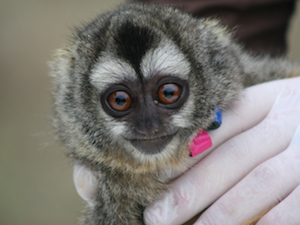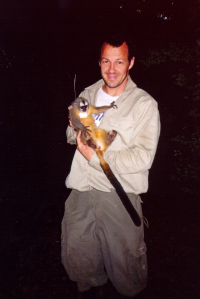
Dr. Eduardo Fernandez-Duque (Professor, Department of Anthropology and School of the Environment) is pleased to invite students to participate in research conducted at either of the two field sites where he works in South America. Dr. Fernandez-Duque’s research examines the ecology and evolution of monogamous social systems in non-human primates. Over the years, and in collaboration with Dr. Anthony Di Fiore (Anthropology, University of Texas at Austin), Dr. Fernandez-Duque has developed a program focused on three genera of socially monogamous primates (titis, sakis and owl monkeys) that inhabit the tropical forests of the Ecuadorian Amazon and the subtropical gallery forests of the Argentinean Chaco.
Owl Monkey Project of the Argentine Chaco
The Owl Monkey Project has a long history of offering opportunities for students. Visiting researchers and students have the opportunity to gain substantial field experience, hone an independent research project, and make use of our extensive database that includes 10 years of monthly phenological data, over 7,000 tagged trees in a 16 ha area, climate data going back almost two decades, and a system of trails spanning 20 km in an undisturbed section of gallery forest in the humid Chaco of Argentina.
Monogamous Primates in Amazonian Ecuador
Our research takes place at the Tiputini Biodiversity Station in Yasuní National Park, Ecuador. Since 2003 we have been conducting a field study of the comparative behavior, ecology, and population genetics of saki (Pithecia sp.) and titi monkeys (Callicebus discolor). There may be opportunities for collecting data on social behavior, foraging, ranging, demographic, and life history data as well as fecal samples for hormonal and genetic analyses from multiple social groups of each species. Other possibilities may exist around monthly plant phenological monitoring and tree and trail mapping.
